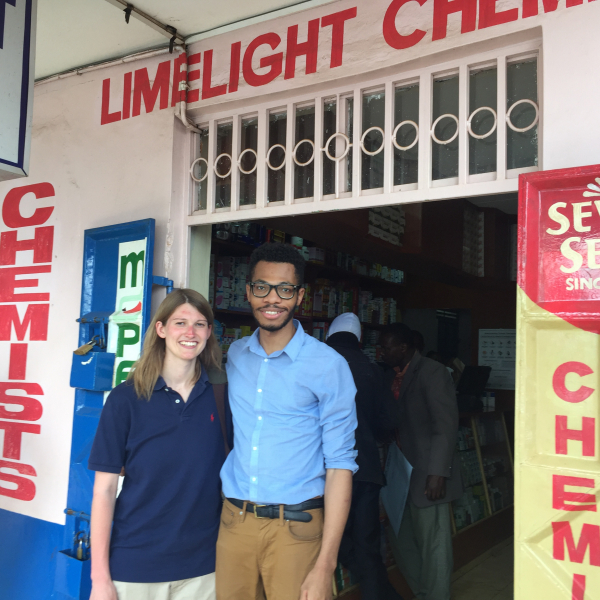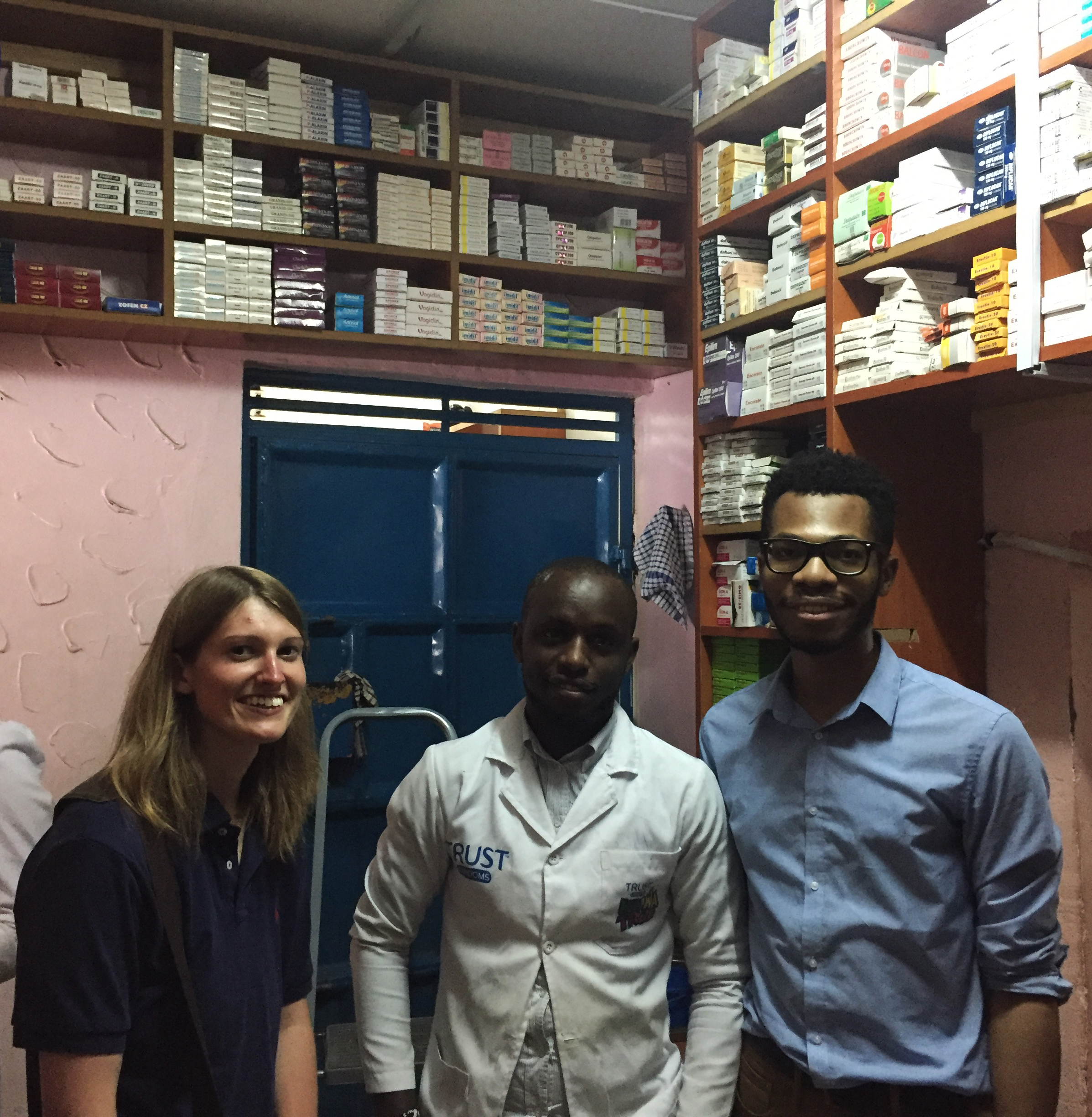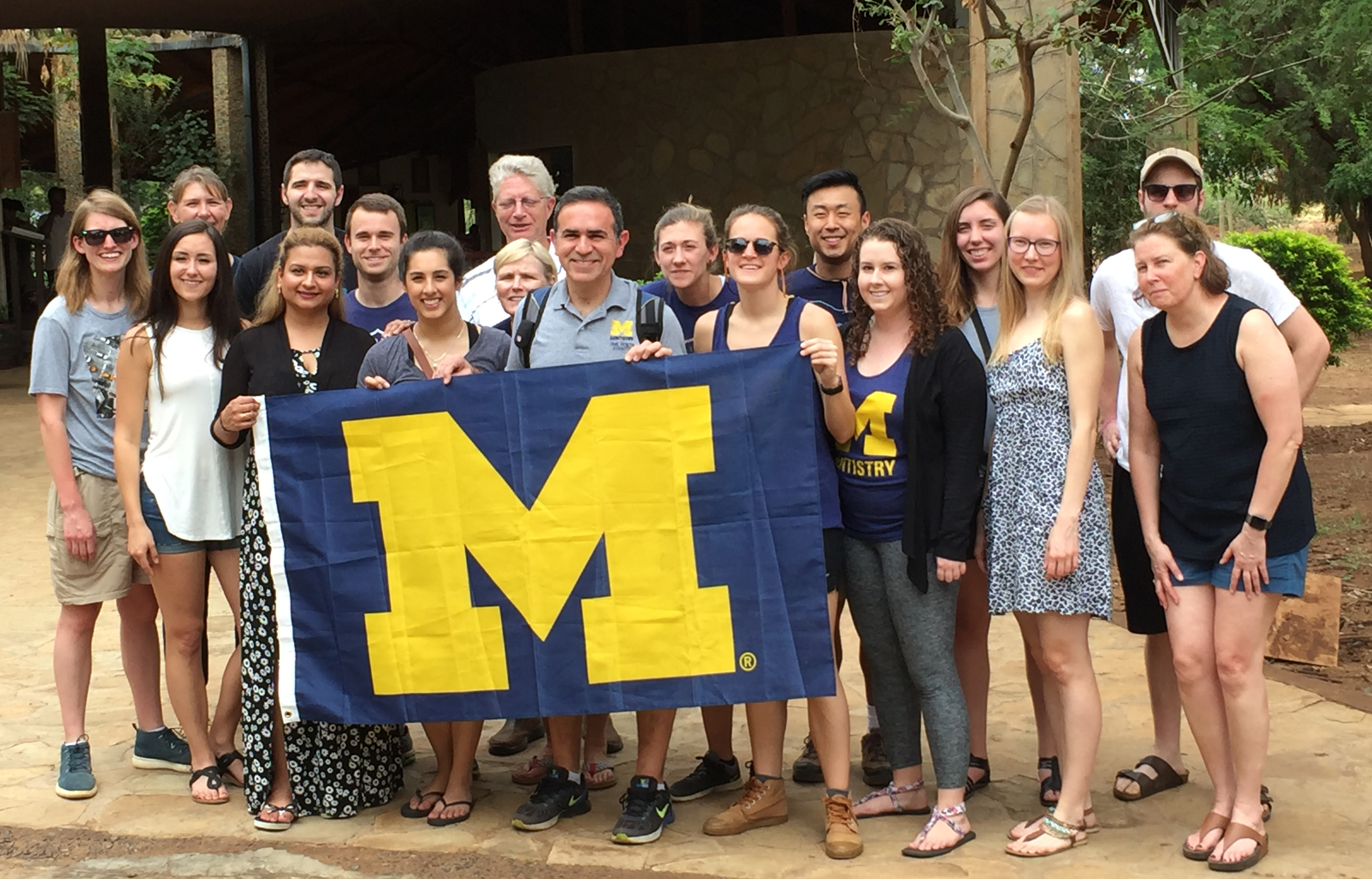Pharmacy Students Gain Valuable Experience During Rotation in Kenya

Fourth-year pharmacy students, Taylor Bergmann and Blaise Ndukwe, traveled to Meru, Kenya as part of their Nontraditional Advanced Pharmacy Practice Experiences (APPE) rotation, focused on research education and interprofessional development. They were accompanied by Vicki Ellingrod, PharmD, John Gideon Searle Professor, Associate Dean for Research and Graduate Education, Professor of Pharmacy.
Taylor and Blaise learned about Kenyan pharmacy practice in both an inpatient and outpatient setting. They shadowed chemists and other health professionals at the Meru Level 5 Hospital, the Consolata Hospital in Nkubu Meru, and Limelight Chemists, a local chemist shop. In the inpatient setting, they observed a typical day for a Kenyan hospital pharmacist. Both hospitals had HIV clinics, where the students learned about the pharmacist’s role of managing HIV patients, including dispensing, counseling, and monitoring of therapy. “Pharmacists in these clinics manage their patients using a team-based approach and have a larger role in managing drug interactions and ensuring medication adherence than other pharmacy settings in Kenya,” explained Taylor. “This experience was an educational highlight for us, because we were able to see that in some areas, Kenyan pharmacists are developing more of a clinical role in patient care. They were also very interested in learning more about pharmacy practice in the United States.” In the outpatient setting, Taylor and Blaise learned about the structure of chemist shops, which are the equivalent of community pharmacies in the United States.
Taylor and Blaise worked with Amy Tremper, MD, an obstetrician-gynecologist at Michigan Medicine, to educate more than 300 high school students on reproductive health and safe sexual practices at multiple schools in Meru. “This education is critical to prevent the spread of HIV and sexual transmitted diseases,” said Blaise. “This type of health information is not currently taught in the public schools.” Dr. Tremper, who has been traveling to Kenya for the last decade, created the reproductive health curriculum for Meru’s high school students.
Accompanying Taylor and Blaise was a group of ten dental and dental hygiene students from the University of Michigan School of Dentistry and two clinical research study coordinators. This provided interprofessional learning opportunities and collaborations. The dental students also helped lead the health education initiatives. “We appreciated the opportunity to spend time with the Dental School students and see the significant impact this group had on the health of numerous primary school students,” added Blaise.
Blaise and Taylor participated in the International Clinical Research Training Workshop, held for the second consecutive year at the Thiiri Center. This workshop is a partnership between the Tharaka Nithi County Health Department, the Meru County Government Health Department, Meru University of Science and Technology, and Consolata Hospital Nkubu Meru, Kenya. Our students lectured on Diabetes Mellitus and Hypertension to an audience of professors, physicians, nurses, and health professional students. They also jointly presented a lecture on medication adherence. These lectures addressed critical health concerns in Kenya.
The students worked alongside public health masters students from Kenya Methodist University to help develop a clinical study focused on the impact of medication and disease state counseling, and follow-up calls on hypertension medication adherence. “We were able to put into practice the knowledge we’ve gained through our course material, particularly P614: Principles of Research Methods and Problem Solving and the skills learned from conducting our own PharmD Investigations project,” noted Taylor.
“Eventually, I plan to establish a clinic in Nigeria within medically underserved village areas that would be managed by clinically-trained pharmacists,” said Blaise. “From this experience, I gained some insight into how I can work on accomplishing this. I now have a better idea of the pharmacist’s role in both countries’ healthcare systems. Clinical pharmacy practice is limited there compared to clinical pharmacy practice in the U.S. But, this rotation showed me that I could train clinical pharmacists through workshops devoted to treatment of important disease states affecting the community. Overall, this experience has helped me begin to think more about the process to achieve my long-term goals.”
“I would recommend this rotation to other students because of how diverse of an experience it is,” added Taylor. “This rotation provides an opportunity to learn about a foreign healthcare system firsthand. As a pharmacist, I plan to be more culturally sensitive and use the skills I was able to cultivate on this trip from being immersed in a community with a culture different from my own. I will focus more on the patient rather than the disease state, and consider how I can alternate the treatment plan to fit the patient’s needs based on their environment. I will also work on establishing interdisciplinary connections as a pharmacist, so that I can more easily direct patients depending on the type of care they need. Knowing what different health professionals do will be incredibly helpful in knowing how to help a patient navigate the healthcare system.”





